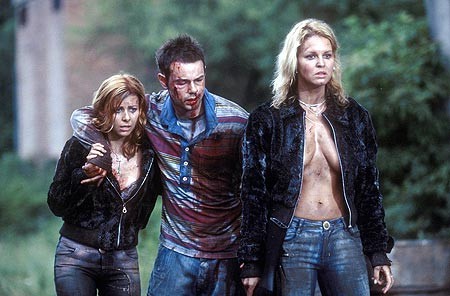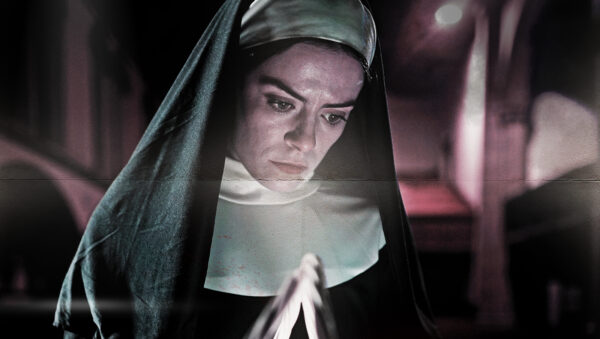Tom Jolliffe looks at Danny Dyer’s film career and some of the standout gems lurking within…
A right sort. A British character from the East End with a way with words and charms you might call divisive. Perhaps to some, a little to gauche, to others a caricature milking his background stereotype and maybe not that authentic anymore. Can you still duck and dive and be a geezer when you’re counting EastEnders‘ Walford wonga? I’d say so.
Dyer’s career as an entertainer has seen him on screen and stage as an actor, on the TV screens as a presenter and personality. He’s had no shortage of praise along the way, back when he was an aspiring actor and he’s even lead Harold Pinter productions on stage. His early career in film got off to an auspicious start. Having done the rounds as a TV bit part specialist his first breakout feature would be a cult favourite. Human Traffic announced Dyer as a promising actor to keep an eye on.
A run of feature parts followed in films like The Trench (with Daniel Craig), Mean Machine (the British reworking of The Longest Yard starring Vinnie Jones), and this busy run, interspersed with more TV work culminated in The Football Factory and The Business. Dyer’s persona on screen was transitioning from loveable scalliwag, to full blown gangster and he was coming to a period of becoming something of an on screen tough guy, which in comparison to Vinnie Jones or The Stath say, might seem inconceivable, though as Dyer surmised in his autobiography (which you can’t help but read hearing Dyer’s inimitable voice), he fancies himself as a better actor (and on song I wouldn’t disagree).
The Business might have been expected to be something of a bigger boost for Dyer’s leading man status. The Nick Love (who also directed Football Factory) cult film showed him in fine fettle, in a film that might not quite have ranked with the Sexy Beasts of this world, but still had plenty to love.
What followed was a period with a mixed output, and times where it seemed Dyer couldn’t buy a gig that wasn’t a straight to video genre film (and occasionally with barrel scraping budgets). A third film with Love, Outlaw didn’t match the success of the first two (though it’s underrated). Between 2005 and 2013 things would be rocky. Dyer was doing just about anything that came his way, for better or worse.
Ask Mark Kermode, who had infamously strong views on the quality (or lack thereof) of some of these works. Some of Kermode’s Dyer reviews remain some of his most watched, even if there’s a particular dismissive pomposity about the benefits of some of these films. Though in the case of Run For Your Wife, even Dyer might agree that one needs to be unceremoniously sealed in concrete and dumped in the North Sea (although in fairness, it’s so bad it’s oddly entertaining).
One highlight from this pre-Queen Vic period was Straightheads. Here’s where I segue clumsily into a 2000 word essay about how much I love Gillian Anderson. The only woman who could make Maggie Thatcher became alluring. Okay, I’ll control myself. Straightheads was a dark, murky and slightly unconventional thriller. It was greeted with indifferent reviews, and never quite picked up the cult following it might have. Not even the much swooned upon Anderson in states of undress could make the film as much of a cult movie as it might deserve.
Straightheads is morally ambiguous and dark, a slight riff here and there on Irreversible (and granted, not with the kind of intense vision a Gaspar Noe might have) as a business woman (Scully) and her toyboy (Dyer) plot revenge on a gang who brutalised them and raped her. The two leads are in good form. I like this one a lot, it just doesn’t click with some folk (and probably understandably).
Severance would strike something of a chord in the post Shaun of the Dead world, where many a Brit film-maker tried to follow in the wake of Edgar Wright and blend horror with some comedy. This would mark one of the best in that period after the first in the Cornetto trilogy. A companies team bonding retreat goes horribly awry. Danny gets stuck in the middle of it of course. Severance is a lot of fun and still remains something of a cult favourite. The film showed Dyer’s gift for comedy certainly but also a knack for picking films with cult potential, when he was a tad more choosy.
A few years after he also made Doghouse another melding of horror and comedy. Maybe given the absolutely stellar cast (including Noel Clarke, Stephen Graham, Billy Murray and Neil Maskell) it could have been better, but it’s still another of the finer examples of the post Shaun horror/comedy which sees Dyer plunged into a village inhabited by man-hating female cannibals.
Among a number of Lock, Stock-lites and routine gangster films, Dyer also found a good vehicle to display his credentials as a Brit tough guy in Vendetta. It’s Dyer’s Get Carter/Death Wish. Even if it doesn’t reach those lofty heights, it does exactly what it promises and with a real aplomb. We’ve seen it a lot in British films, but on occasion churned out without care. Not so here. Dyer, a special ops interrogator returns home on the lookout for information. As we discover, his parents were burnt alive in their own home and then we further discover by a local gang of criminals. The gang rule the roost where police apathy and red tape make justice hopeless.
We might have seen it before but thanks to a tight script by writer/director/editor Stephen Reynolds, the film holds the interest and also pulls an excellent performance from Dyer. In terms of his tough guy films it’s his most convincing and a big part of that is down to imbuing some added dimension to his character. Additionally, unlike many indie British revenge films, it feels like a directors movie. A Reynolds pre-to-post grip on the story feels tight. It’s also blessed with some fantastic cinematography (Haidar Zafar) and a great score (Phil Mountford). As is the wont for this genre, critics weren’t always kind (or dismissive of the well worn concept), but given a dearth in quality British revenge films, this one certainly fit the bill for a post Harry Brown landscape.
Dyer’s eventual move to EastEnders inevitably slowed his film output (given the commitment required), but certainly closed off a period with a very mixed output. Too oft unfairly dismissed, Dyer still managed to bring his A game (better than some might give him credit for) to several standout films and some of the more enjoyable modern era films in the Indie British genre world. Right I’m off to have some crumpets, and to quote Mr Dyer himself, they’ll be “absolutely pissing in marmite.”
What are your thoughts on Danny Dyer’s film work and the aforementioned movies? Let us know on our social channels @flickeringmyth…
If you’d like to support our efforts to make our very own feature film, then please check out the crowdfunding campaign for The Baby in the Basket, a 1940s-set Gothic horror due to go into production this year. We’ve got a bunch of perks available, on-screen thanks, walk-on/voice roles, and producer credits and you can grab yourself a copy of the finished film (and help make it the very best it can be) for just £10!
Tom Jolliffe is an award winning screenwriter and passionate cinephile. He has a number of films out around the world, including When Darkness Falls and several releases due out soon, including big-screen releases for Renegades (Lee Majors, Danny Trejo, Michael Pare, Tiny Lister, Nick Moran, Patsy Kensit, Ian Ogilvy and Billy Murray) and War of The Worlds: The Attack (Vincent Regan). Find more info at the best personal site you’ll ever see.



















